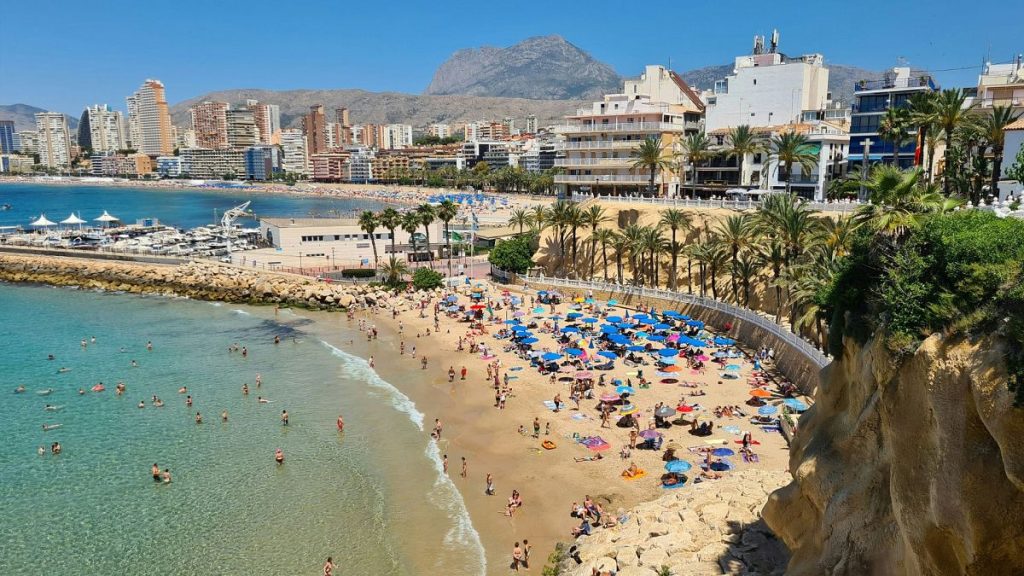Summarize this content to 2000 words in 6 paragraphs in Arabic
From taxes in Portugal to Airbnb bans in Spain, we explain all the rules that could affect your 2025 European holiday.
ADVERTISEMENTTravel in Europe is getting more complicated to navigate for tourists. Some cities now charge a daily tourist tax that you have to pay on arrival, Locals in certain holiday hotspots have made it clear that you’re not welcome with outright bans on beaches or limits to visitor numbers at top attractions. Other destinations say you’re welcome – as long you follow the rules. With a simple holiday in Europe getting harder to book as you navigate the increased tourist restrictions, Euronews Travel shares a lowdown on all the year’s travel watchouts.Is Spain really banning tourists?There’s been a good deal of press about Spain’s struggle with overtourism. From high-profile protests to new rules and regulations, it’s easy to think tourists are no longer welcome in Spain.While some have called the actions of the Spanish government a ‘tourist ban,’ it’s not that at all. Policies are in place to curb overtourism in the most popular destinations like Mallorca, Tenerife and Barcelona, but the moves are more about managing tourism rather than stopping it.Holiday rentals including Airbnb-style rentals and apartments, can still be booked. The only accommodations affected by the changes are flats registered after February 2024 that don’t have their own entrances. For those lets, licenses will be permanently cancelled.Various cities are introducing curbs on new rental properties entering the market, including in Malaga, where short-term lets are banned in 43 neighbourhoods. Barcelona plans to phase out tourist apartment rentals by 2028, and restrictions are in place in Alicante and Madrid.The main difference you’ll notice if you’re heading to Spain this year will be the need to provide extra details when staying at accommodation or renting a car. Expect to be asked for information like your nationality, address, phone number, and email address as part of the new tourism rules.Where will tourist numbers be restricted?Cruise passengers are being restricted all over the place. From Ibiza limiting simultaneous docking to Barcelona reducing the number of cruise ships that can visit, several European cities want to curb the influx of thousands of cruise passengers.For holidaymakers, these new rules won’t affect your trip, as your cruise company will have planned their schedule taking into account rules and restrictions. However, it’s worth being aware of local taxes payable for entering the city, such as in Venice, which is €5 or €10 – more details below.Some major tourist attractions are limiting visitor numbers to combat overtourism. For example, the iconic Acropolis in Athens is capped at 20,000 visitors a day, and slots need to be booked in advance to visit.Pompeii was straining under the weight of more than four million visitors in 2024 and, as such, is also introducing a 20,000 visitor cap in 2025. In Rome, the Colosseum is capped at 3,000 visitors at any one time.In Seville, there are plans to close the Plaza de España and charge tourists €3 to €4 to visit, although this has not been enforced yet.Sardinia’s unique Spiaggia Rosa beach has been closed to the public since 1998 to protect its pink sands and wildlife. Since 2023, Italy has stepped up its policing of the beach and is actively issuing fines of €500 to €3,500 for trespassing.Various other destinations have restricted tourist behaviours and are issuing fines. In Prague, costumed groups of stag and hen parties are not welcome, while in Rome, shirtless men and ‘love padlocks’ on bridges could get you fined. Check the restrictions for your destination to avoid upsetting the locals.ADVERTISEMENTWhere will you have to pay a tourist tax this year?Several holiday hotspots will add or increase their tourist tax this summer.GreeceVisitors to Greece will pay a tax of €8 per day, which works out to an added cost of €56 per adult for a week-long trip. Some accommodations don’t charge for children, while others offer a reduced rate.In addition to the tourist tax, Greece also applies a Climate Resilience Tax, collected at check-in, and applicable to all hotels, villas, Airbnbs, and other accommodations. The cost ranges from €1.50 for the most basic lodgings up to €10 per night for luxury hotels.Visiting in the off-season can be lucrative here. Outside of April to October, the tourist tax reduces to €2 per day, and the environmental tax to between €0.50 and €4 a day.ADVERTISEMENTCruise passengers are liable for extra taxes this year, too, although the amount you pay will depend on where you go.Visiting Santorini or Mykonos on a cruise is going to cost €20, while other locations are just €5. The higher tax for the two Cyclades Islands follows a record summer for visitors last year, where the islands were overwhelmed with up to 20,000 cruise passengers a day, far exceeding the native population.PortugalThe tourist tax situation in Portugal is less straightforward, as the 306 different municipalities make their own rules about taxation. At present, at least 26 municipalities are charging a tax, mostly in the typical resort locations like the Algarve and also Lisbon.As an example, Setúba, just outside Lisbon, introduced a tax of €2 per person per night last year, which will continue into 2025. Lisbon city charges €2 per night, as does Madeira and Faro. Previously untaxed Azores has begun charging €2 per person per night from January 2025.ADVERTISEMENTSpainLike Portugal, Spain’s regions set their own rules, and the taxes you pay will depend on where you go. In Barcelona, there are two taxes to pay – a city tax and a regional tourist tax. The city tax has risen to €4 per person per night for 2025, while the tourist tax has not increased. Cruise ship passengers staying in Barcelona for more than 12 hours need to pay €6.25.Tourist tax is paid based on the accommodation, ranging from €1.70 a night for basic hotels to €3.50 for luxury accommodation. Outside of Barcelona, in the wider Catalonia region, the same tourist tax is payable, but not the city tax.In the Balearic Islands, the high season attracts a green tax ranging from €4 per person per night for luxury hotels to €1 for hostels and campsites. ADVERTISEMENTIn the first Spanish tourist tax to be implemented at a municipal level, Mogan City Council on Gran Canaria has applied a modest tax for visitors starting this year. The new rules, applied across all establishments at the same rate, is €0.15 per person per night.Several other cities – including Valencia and Madrid – have proposed tourist taxes, but none have been allowed yet. Nevertheless, it’s always worth checking with your accommodation whether there are any extra charges to be aware of.ItalyItalian municipalities set their own tourist tax rates, so again, the fees payable will depend on where you stay and visit.In large cities, there will almost certainly be a tourist tax applied. In Rome, for example, it ranges from €3 to €7, depending on the standard of accommodation. In Milan, it’s between €2 and €5, and in Florence from just €1 to €5.ADVERTISEMENTLast year, Italy floated implementing a much higher tourist tax of up to €25 for the most expensive hotels, to be applied on top of existing municipal levies. The government says the fee will help tackle overtourism but is still debating the issue.“In times of overtourism, we are debating this so that it really helps improve services and makes tourists who pay it more responsible,” Italy’s minister of tourism, Daniela Santanche, commented at the announcement.If you’re heading to the floating city, Venice has expanded the days it will charge day trippers to visit. Between 18 April and 27 July, day visitors arriving on Friday to Sunday or a public holiday will need to pay €5, rising to €10 if the booking is made less than four days in advance. It can be paid before the trip which will generate a QR code you should keep with you during your visit. You can also pay via WhatsApp and on arrival at a Punto Lis tobacconist.ADVERTISEMENTElsewhereIn Paris, there are new tourist taxes applicable in 2025. Both a regional tax and a tourist tax need to be paid, which change based on the type of accommodation. In total, the combined taxes range from as little as €1.95 for campsites and up to €15.60 per person per night for the most luxurious accommodation.Amsterdam continues to charge a tourist tax and has raised its fee for visitors from 7 per cent to 12.5 per cent of the accommodation cost. As a guide, a hotel costing €175 a night would attract taxation of €21.80 per night.Several UK cities are mulling tourist taxes, with Edinburgh in the spotlight as potentially the first city to implement a mandatory levy. Wales is also contemplating taxing visitors, as is London, but as yet, none of these schemes have been launched.New travel authorisation rules explainedBrits going abroad and Europeans going to the UK alike have an extra item to remember on their packing list this year. ADVERTISEMENTFor people visiting the UK, the new Electronic Travel Authorisation (ETA) will be required. It’s already in effect for people visiting from outside the EU – but will be coming in for EU citizens on 2 April.The ETA cost €11.82 at launch, and that’s what visitors are currently paying. However, the UK government floated a hike to the cost just two weeks into the scheme, proposing raising it to €18.91. It’s yet to be debated in UK parliament but experts say it would add significantly to the cost of a holiday, particularly for families.Given that the ETA is valid for two years, travellers planning to visit the UK at any point in the next couple of years are encouraged to apply sooner rather than later. EU residents can apply for the ETA from 5 March 2025.For British residents heading to Europe, there is currently no paperwork required for trips in the Schengen area. But later in 2025, a new rule is due to launch.ADVERTISEMENTThe European Travel Information and Authorisation System (ETIAS), alongside the new Entry/Exit System (EES) has been delayed time and again. The latest update estimates ETIAS will come into force in mid-2025, all being well.The EU has said that ETIAS will launch six months after the EES launches. It’s purported to cost €7, but there’s no fixed timeline on when it will roll out yet.
rewrite this title in Arabic All the tourist taxes, restrictions and bans in Europe in 2025
مقالات ذات صلة
مال واعمال
مواضيع رائجة
النشرة البريدية
اشترك للحصول على اخر الأخبار لحظة بلحظة الى بريدك الإلكتروني.
© 2026 جلوب تايم لاين. جميع الحقوق محفوظة.














